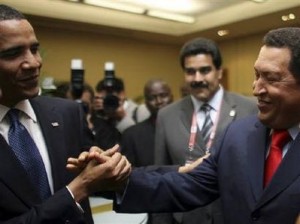Hugo Chávez, Deadbeat
Chávez’s hare-brained economic policies are being felt on the street, with shortages of electricity, foodstuffs, and housing, not to mention rampant street crime, taking a toll on the working class — his political base — the country is gearing up for a presidential election in October 2012.
by Jose R. Cardenas at The Americano
 Even as he continues to suffer a serious illness, Venezuelan President Hugo Chávez shows no letup in his headlong pursuit of building his vaunted “21stcentury socialism.” No one is quite sure — including probably Chávez — what that’s going to inevitably look like, but it clearly includes a lack of respect for private property rights and flouting the rules of international commerce.
Even as he continues to suffer a serious illness, Venezuelan President Hugo Chávez shows no letup in his headlong pursuit of building his vaunted “21stcentury socialism.” No one is quite sure — including probably Chávez — what that’s going to inevitably look like, but it clearly includes a lack of respect for private property rights and flouting the rules of international commerce.
Recently, the Wall Street Journal reported that Chávez was drawing up plans to withdraw Venezuela from the World Bank’s International Center for the Settlement of Investment Disputes (ICSID), a little-known, but important entity for multinational corporations to arbitrate disputes with foreign governments.
That followed an earlier Chávez announcement that he was transferring $6 billion in cash reserves held in U.S. and European banks to Russia and China, in addition to repatriating some 200 tons of gold – valued at $11 billion – held abroad to Venezuela’s Central Bank.
The clear implications of these decisions are that, one, Chávez is not interested in compensating the some 20 companies that are seeking more than $40 billion in claims at ICSID for properties he has confiscated from them, and, secondly, he is taking measures to ensure Venezuela has no assets abroad that can be seized in retaliation.
Incredibly, over the past decade, as Chávez has amassed more power and increased state control of the Venezuelan economy, he has ordered the nationalization of some 988 foreign and domestic companies. While he hasn’t totally reneged on his obligations — there have been some compensations — the prospects that remaining claimants will get paid their due are declining by the day.
Several days ago, Venezuelan Oil Minister Rafael Ramírez drove home the point, referring to oil claimants ExxonMobil and ConocoPhillips as “typical companies from the empire [the United States],” and that his government will not honor any unfavorable decisions made by international courts like ICSID. (Ironically, his comments were made at a conference sponsored by the state oil company to drum up foreign investment in the oil sector.)
Meanwhile, the legal shoes continue to drop. Two more U.S. companies recently sought legal redress against the Chávez government. First, oil services company Helmerich & Payne filed a lawsuit in the U.S. against Venezuela over the confiscation of 11 drilling rigs belonging to the company.
Days later, U.S. bottle maker Owens Illinois filed a claim for arbitration against Venezuela at ICSID over its confiscated properties in October 2010. (The company had operated in the country for more than five decades and employed more than 1,000 workers.)
To be sure, no one forced these companies to invest their dollars abroad, and overseas investments are always risky ventures in countries with weak rule of law. But global prosperity — and U.S. security — also depends on vibrant international trading and investment regimes where adherence to accepted rules and behavior benefits all.
Of course, Hugo Chávez has always believed that Venezuela’s vast oil wealth  allows him to play by his own rules — but he’s playing a risky game. Foreign investment in Venezuela is already sinking like a stone as a result of his rash decisions. According to the United Nations Conference on Trade and Development, foreign direct investment was a negative $3.1 billion in 2009 and a negative $1.4 billion in 2010.
allows him to play by his own rules — but he’s playing a risky game. Foreign investment in Venezuela is already sinking like a stone as a result of his rash decisions. According to the United Nations Conference on Trade and Development, foreign direct investment was a negative $3.1 billion in 2009 and a negative $1.4 billion in 2010.
In downgrading Venezuela’s credit rating recently, Standard & Poor cited growing “uncertainty” over Chávez’s “changing and arbitrary laws, price and exchange controls, and other distorting and unpredictable economic measures [that] have undermined private-sector investment and hurt productivity, weakening Venezuela’s domestic economy.”
It so happens that as the results of Chávez’s hare-brained economic policies are being felt on the street, with shortages of electricity, foodstuffs, and housing, not to mention rampant street crime, taking a toll on the working class — his political base — the country is gearing up for a presidential election in October 2012. Chávez still remains extremely popular with his base, but their declining economic fortunes, and with the uncertainty swirling around Chávez’s health, may mean the Venezuelan populist’s re-election, for the first time in a long time, won’t be a slam dunk.
José R. Cárdenas served in several foreign policy positions during the George W. Bush administration (2004-2009), including on the National Security Council staff. He is a consultant with Vision Americas in Washington, D.C., and edits the website www.interamericansecuritywatch.com and blogs at http://shadow.foreignpolicy.com/.
Help Make A Difference By Sharing These Articles On Facebook, Twitter And Elsewhere:
